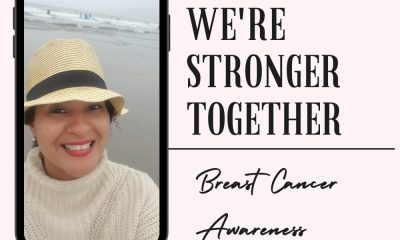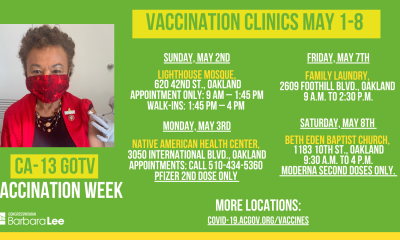Business
CVS Health Launches Health, Beauty Makeover for Drugstores

This June 20, 2011 photo shows signage at a CVS store in Philadelphia. CVS drugstores that quit tobacco sales last year are now getting health and beauty makeovers to attract customers who want more than a prescription refill, the nations second-largest drugstore chain said Wednesday, June 17, 2015. (AP Photo/Matt Rourke, File)
TOM MURPHY, AP Business Writer
CVS drugstores that quit tobacco sales last year are now getting health and beauty makeovers and a shot of ethnic diversity in some cases to attract customers who want more than a prescription refill.
The nation’s second-largest drugstore chain said Wednesday that it is adding fresh foods, healthy snacks and expanded beauty options to many of its locations. It also is testing a new format designed for stores that serve Hispanic populations.
CVS Health Corp. executives say these changes reflect customer demand. They also could help perk up store sales outside the pharmacy area that have slumped since the company phased out tobacco last September.
The push from CVS reflects similar expansions by rivals Walgreens Boots Alliance Inc. and Rite Aid Corp. into selling healthier foods and more beauty items. Drugstores have been focusing more for a few years now on customizing their stores to what shoppers in a specific market want instead of simply building new locations.
They’ve also added clinics and expanded their health care services in part to get more business from aging baby boomers and people who are gaining insurance coverage through the federal health care overhaul. And drugstores are offering a wider array of products outside the pharmacy to satisfy customers who want to make fewer stops when they go shopping.
“Health and beauty, in particular, is very high profit margin, and CVS has always been a leader there,” said Jeff Jonas, a portfolio manager who follows the industry for Gabelli Funds.
CVS Health, which recently announced a partnership with Target Corp. to expand its health care business, runs about 7,800 drugstores nationwide
The Woonsocket, Rhode Island-based chain said Wednesday that it is adding fresh and refrigerated foods to about 500 of its stores and bulking up on healthier snacks chainwide. Bagged candy, which occupies the first aisle in many stores, is being moved back and replaced with nuts, trail mixes and granola, among other items.
“Consumers used to eat three meals a day, and now they tend to be snacking through the day, and they’re really looking for a convenient location which gives them access to healthier foods,” Executive Vice President Helena Foulkes said.
CVS started adding groceries to some urban stores a few years ago to serve customers who don’t have easy access to a supermarket. The company recently started testing a new wrinkle to that themed concept with a dozen, mostly remodeled stores named CVS/pharmacy y mas in South Florida.
These stores are staffed by bilingual workers and sell brands popular with Hispanic customers as well as products like espresso makers and rice cookers. They also sell an espresso-style coffee called Cafecito in their pharmacies. CVS designed the concept based on insights it gained after buying the small Navarro Discount Pharmacy chain last year.
The company also is adding more beauty products and improving the look of that section in many of its stores.
Foulkes said health and beauty sales have grown 25 percent faster over the last three years than general merchandise and edibles in the front of their stores, or the area outside the pharmacy. Bulking up on beauty caters to women, who make up 80 percent of their store customer base.
“They see beauty as being part of their definition of health,” Foulkes said. “Women talk a lot about feeling good and looking good.”
CVS Health declined to detail how much it is spending on all the changes. The investment is focused on an area of the company’s business that could use a boost.
Revenue from the front end of the company’s established drugstores, or the area outside the pharmacy, has slipped the past couple of quarters. It was down 6 percent in the first quarter but would have risen about 2 percent without the loss of revenue brought in by tobacco.
Retailers don’t make a lot of money off tobacco, but it draws customers who often pick up other items like a can of soda or a snack when they visit.
CVS draws most of its drugstore revenue from its pharmacies. Most of its corporate revenue comes from running one of the nation’s largest pharmacy benefits management businesses, which handles prescription drug plans for employers, insurers and other customers.
Company shares climbed 65 cents to $103.82 Wednesday, slightly outpacing broader trading indexes.
Copyright 2015 The Associated Press. All rights reserved. This material may not be published, broadcast, rewritten or redistributed.
Bay Area
State Controller Malia Cohen Keynote Speaker at S.F. Wealth Conference
California State Controller Malia Cohen delivered the keynote speech to over 50 business women at the Black Wealth Brunch held on March 28 at the War Memorial and Performing Arts Center at 301 Van Ness Ave. in San Francisco. The Enterprising Women Networking SF Chapter of the American Business Women’s Association (ABWA) hosted the Green Room event to launch its platform designed to close the racial wealth gap in Black and Brown communities.

By Carla Thomas
California State Controller Malia Cohen delivered the keynote speech to over 50 business women at the Black Wealth Brunch held on March 28 at the War Memorial and Performing Arts Center at 301 Van Ness Ave. in San Francisco.
The Enterprising Women Networking SF Chapter of the American Business Women’s Association (ABWA) hosted the Green Room event to launch its platform designed to close the racial wealth gap in Black and Brown communities.
“Our goal is to educate Black and Brown families in the masses about financial wellness, wealth building, and how to protect and preserve wealth,” said ABWA San Francisco Chapter President LaRonda Smith.
ABWA’s mission is to bring together businesswomen of diverse occupations and provide opportunities for them to help themselves and others grow personally and professionally through leadership, education, networking support, and national recognition.
“This day is about recognizing influential women, hearing from an accomplished woman as our keynote speaker and allowing women to come together as powerful people,” said ABWA SF Chapter Vice President Velma Landers.
More than 60 attendees dined on the culinary delights of Chef Sharon Lee of The Spot catering, which included a full soul food brunch of skewered shrimp, chicken, blackened salmon, and mac and cheese.
Cohen discussed the many economic disparities women and people of color face. From pay equity to financial literacy, Cohen shared not only statistics, but was excited about a new solution in motion which entailed partnering with Californians for Financial Education.
“I want everyone to reach their full potential,” she said. “Just a few weeks ago in Sacramento, I partnered with an organization, Californians for Financial Education.
“We gathered 990 signatures and submitted it to the [California] Secretary of State to get an initiative on the ballot that guarantees personal finance courses for every public school kid in the state of California.
“Every California student deserves an equal opportunity to learn about filing taxes, interest rates, budgets, and understanding the impact of credit scores. The way we begin to do that is to teach it,” Cohen said.
By equipping students with information, Cohen hopes to close the financial wealth gap, and give everyone an opportunity to reach their full financial potential. “They have to first be equipped with the information and education is the key. Then all we need are opportunities to step into spaces and places of power.”
Cohen went on to share that in her own upbringing, she was not guided on financial principles that could jump start her finances. “Communities of color don’t have the same information and I don’t know about you, but I did not grow up listening to my parents discussing their assets, their investments, and diversifying their portfolio. This is the kind of nomenclature and language we are trying to introduce to our future generations so we can pivot from a life of poverty so we can pivot away and never return to poverty.”
Cohen urged audience members to pass the initiative on the November 2024 ballot.
“When we come together as women, uplift women, and support women, we all win. By networking and learning together, we can continue to build generational wealth,” said Landers. “Passing a powerful initiative will ensure the next generation of California students will be empowered to make more informed financial decisions, decisions that will last them a lifetime.”
Business
Black Business Summit Focuses on Equity, Access and Data
The California African American Chamber of Commerce hosted its second annual “State of the California African American Economy Summit,” with the aim of bolstering Black economic influence through education and fellowship. Held Jan. 24 to Jan. 25 at the Westin Los Angeles Airport Hotel, the convention brought together some of the most influential Black business leaders, policy makers and economic thinkers in the state. The discussions focused on a wide range of economic topics pertinent to California’s African American business community, including policy, government contracts, and equity, and more.

By Solomon O. Smith, California Black Media
The California African American Chamber of Commerce hosted its second annual “State of the California African American Economy Summit,” with the aim of bolstering Black economic influence through education and fellowship.
Held Jan. 24 to Jan. 25 at the Westin Los Angeles Airport Hotel, the convention brought together some of the most influential Black business leaders, policy makers and economic thinkers in the state. The discussions focused on a wide range of economic topics pertinent to California’s African American business community, including policy, government contracts, and equity, and more.
Toks Omishakin, Secretary of the California State Transportation Agency (CALSTA) was a guest at the event. He told attendees about his department’s efforts to increase access for Black business owners.
“One thing I’m taking away from this for sure is we’re going to have to do a better job of connecting through your chambers of all these opportunities of billions of dollars that are coming down the pike. I’m honestly disappointed that people don’t know, so we’ll do better,” said Omishakin.
Lueathel Seawood, the president of the African American Chamber of Commerce of San Joaquin County, expressed frustration with obtaining federal contracts for small businesses, and completing the process. She observed that once a small business was certified as DBE, a Disadvantaged Business Enterprises, there was little help getting to the next step.
Omishakin admitted there is more work to be done to help them complete the process and include them in upcoming projects. However, the high-speed rail system expansion by the California High-Speed Rail Authority has set a goal of 30% participation from small businesses — only 10 percent is set aside for DBE.
The importance of Diversity, Equity and Inclusion (DEI) in economics was reinforced during the “State of the California Economy” talk led by author and economist Julianne Malveaux, and Anthony Asadullah Samad, Executive Director of the Mervyn Dymally African American Political and Economic Institute (MDAAPEI) at California State University, Dominguez Hills.
Assaults on DEI disproportionately affect women of color and Black women, according to Malveaux. When asked what role the loss of DEI might serve in economics, she suggested a more sinister purpose.
“The genesis of all this is anti-blackness. So, your question about how this fits into the economy is economic exclusion, that essentially has been promoted as public policy,” said Malveaux.
The most anticipated speaker at the event was Janice Bryant Howroyd known affectionately to her peers as “JBH.” She is one of the first Black women to run and own a multi-billion-dollar company. Her company ActOne Group, is one of the largest, and most recognized, hiring, staffing and human resources firms in the world. She is the author of “Acting Up” and has a profile on Forbes.
Chairman of the board of directors of the California African American Chamber of Commerce, Timothy Alan Simon, a lawyer and the first Black Appointments Secretary in the Office of the Governor of California, moderated. They discussed the state of Black entrepreneurship in the country and Howroyd gave advice to other business owners.
“We look to inspire and educate,” said Howroyd. “Inspiration is great but when I’ve got people’s attention, I want to teach them something.”
Activism
Oakland Post: Week of April 17 – 23, 2024
The printed Weekly Edition of the Oakland Post: Week of April 17 – 23, 2024

To enlarge your view of this issue, use the slider, magnifying glass icon or full page icon in the lower right corner of the browser window. ![]()
-

 Activism4 weeks ago
Activism4 weeks agoOakland Post: Week of March 27 – April 2, 2024
-

 #NNPA BlackPress4 weeks ago
#NNPA BlackPress4 weeks agoCOMMENTARY: D.C. Crime Bill Fails to Address Root Causes of Violence and Incarceration
-

 #NNPA BlackPress4 weeks ago
#NNPA BlackPress4 weeks agoMayor, City Council President React to May 31 Closing of Birmingham-Southern College
-

 #NNPA BlackPress4 weeks ago
#NNPA BlackPress4 weeks agoBeloved Actor and Activist Louis Cameron Gossett Jr. Dies at 87
-

 Community1 week ago
Community1 week agoFinancial Assistance Bill for Descendants of Enslaved Persons to Help Them Purchase, Own, or Maintain a Home
-

 Activism3 weeks ago
Activism3 weeks agoOakland Post: Week of April 3 – 6, 2024
-

 Business1 week ago
Business1 week agoV.P. Kamala Harris: Americans With Criminal Records Will Soon Be Eligible for SBA Loans
-

 Activism2 weeks ago
Activism2 weeks agoOakland Post: Week of April 10 – 16, 2024


![Marin County Public Health Officer Dr. Matt Willis updated the Board of Supervisors on March 28 about the state of the local opioid crisis[PDF] and outlined strategies to reduce fatal overdoes in Marin in 2023.](https://www.postnewsgroup.com/wp-content/uploads/2023/04/opioid-settlement-featured-web-400x240.jpg)
![Marin County Public Health Officer Dr. Matt Willis updated the Board of Supervisors on March 28 about the state of the local opioid crisis[PDF] and outlined strategies to reduce fatal overdoes in Marin in 2023.](https://www.postnewsgroup.com/wp-content/uploads/2023/04/opioid-settlement-featured-web-80x80.jpg)




















































